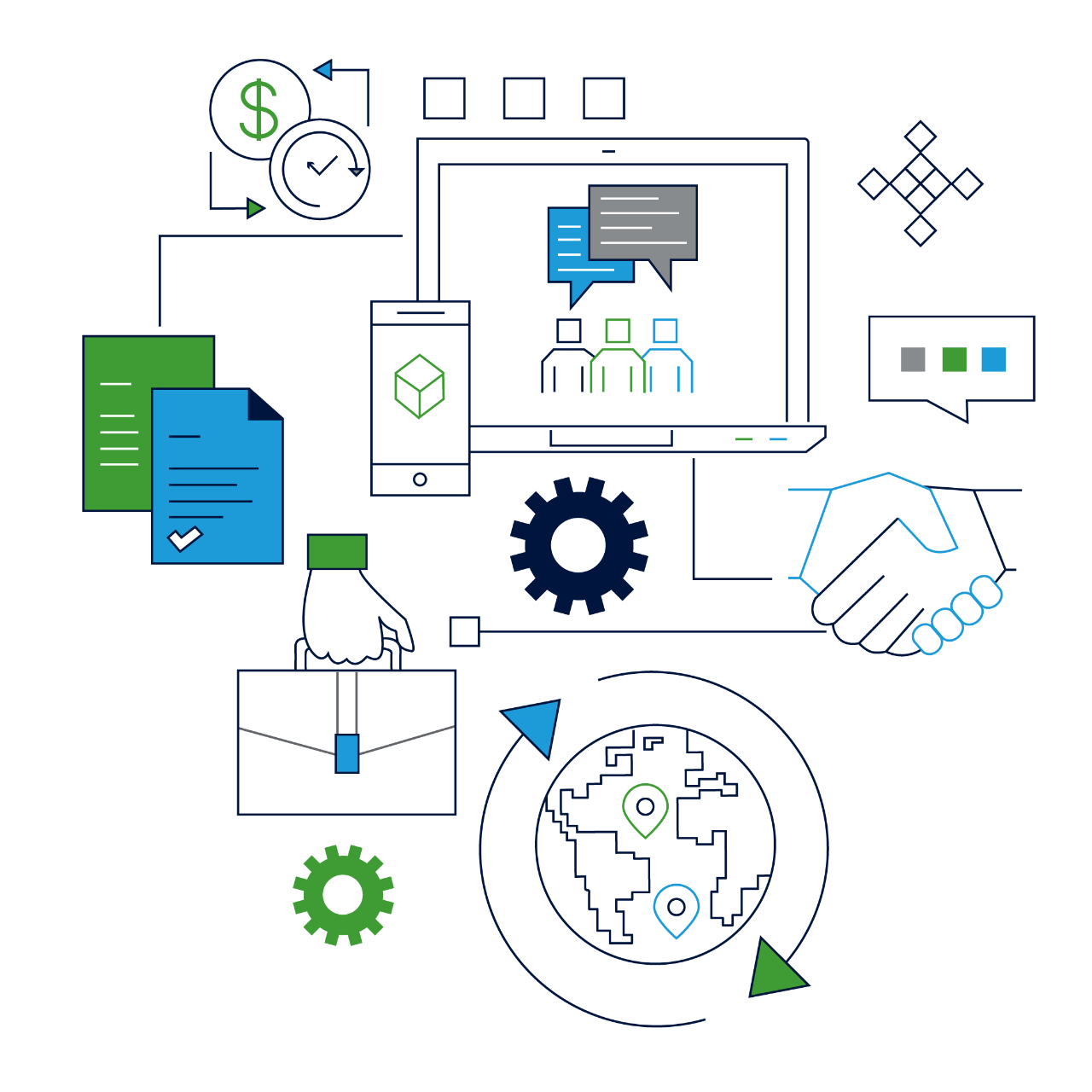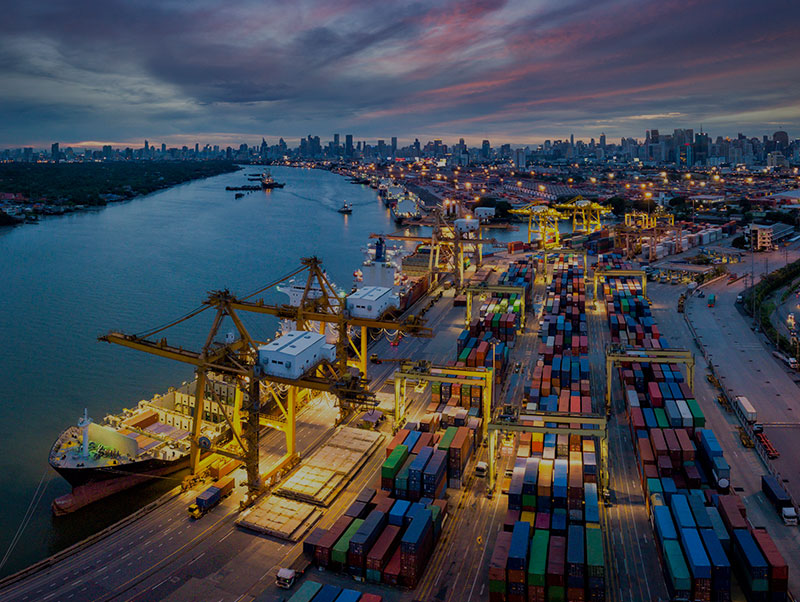Strengthen your supply chain with the help of knowledgeable specialists
Get the latest technology so your operation runs smoothly regardless of regulatory requirements and unplanned disruptions.
What is supply chain management?
Global supply chain management is the coordination of processes, resources, and logistics across countries to efficiently move materials and finished goods in order to optimize efficiency, minimize risk, and ensure supply chain resilience. Operating on a global scale requires companies to navigate complex international trade laws, diverse market regulations, and evolving geopolitical factors while meeting regulatory requirements, controlling costs, and fulfilling demand.
The process of global supply chain management involves sourcing materials, managing production, overseeing logistics, and utilizing data analytics to enhance visibility and decision-making. Operating globally constitutes a myriad of challenges that differ by market, such as fluctuating tariffs, supply chain disruptions, compliance complexities, and sustainability practices. To navigate in this environment and remain competitive, middle market companies must be nimble while also leveraging advanced technology and maintaining full transparency through sophisticated data analysis.
RSM’s supplier risk assessment and solution
RSM has formed a strategic business alliance with Equifax to provide a one-of-a-kind supplier risk Rapid Assessment®. Our risk assessment experience, coupled with the Equifax Supplier Risk Solution™ platform, provides a deeper understanding of your supply chain. Leveraging technology to assess multiple types of risk within your supplier network can improve the effectiveness of onboarding new suppliers while simultaneously flagging changes in the risk profile of existing suppliers.
The supplier risk assessment offers:
- Greater insight into your supply chain
- Analysis of your supply chain risk, including financial, cybersecurity, geopolitical and operational
- Identification of mitigation strategies that align with best practices and standards
- Development of a pathway to compliance
- Evaluation of environmental, social and governance (ESG) risks and the identification of opportunities that may enhance your company’s ESG position

Next-generation supply chain management
You want to limit supply chain disruptions and build resiliency, but that’s no easy task. Our advisors’ supply chain, technology, ESG and industry experience, combined with the Supplier Risk Solution platform, can make the difference.
Table of contents
- Digital transformation and digital twin simulation
- The right ERP for supply chain management
- ESG and sustainability reporting in supply chains
- Risk management in supply chain management
- John Paul Mitchell Systems adjusts for changing market
- Global cost and tax-efficient supply chains
- Scaling for growth and market expansion
- A guide for supply chain management
- Moving forward
- Supply chain FAQ
Digital transformation and digital twin simulation
The acceleration of digital channels, the migration to digital platforms and the changing nature of work necessitate embracing digital tools and processes to remain competitive in a rapidly evolving market.
RSM can help you unlock operational value and enhance agility by modernizing your digital platforms and transforming your operating model. One of the outcomes of this transformation could be a digital twin simulation to help you better understand the operational and financial impact of change before making a large investment in your organization. Digital twins have saved RSM clients millions in unnecessary spending.
The right ERP solution for supply chain management
Our advisors help you select the best enterprise resource planning (ERP) software option to optimize accounting, inventory, supply chain and order management. We have strategic relationships with the strongest middle market ERP software vendors—Microsoft, Oracle and Sage Intacct—and have earned multiple recognitions by Accounting Today as the No. 1 value-added software reseller in the country.
Microsoft Dynamics 365
Create a connected supply chain and streamline operations for greater profitability with Dynamics 365 Supply Chain Management. Modern digital technologies allow you to better manage inventory, vendors, planning, production, warehousing and transportation.
Oracle NetSuite
RSM has enabled more than 2,000 organizations to leverage Oracle NetSuite capabilities to drive success. With our dedicated industry teams, you can be sure to receive the latest best practices for your industry along with implementation services aligned to meet your unique business objectives.
Sage Intacct
RSM is a five-time Sage Intacct Partner Award winner, serving over 500 clients since 2009. Our team has broad market knowledge and in-depth industry experience highlighted by an industry eminence program, enabling them to look at your business holistically and tailor your solutions.
ESG and sustainability reporting in supply chains
Better supply chain management is not something companies should pursue just to gain a competitive edge; increasingly, regulators are putting forth requirements related to supply chain transparency and fair labor practices.
For example, Canada’s supply chain act, dubbed the Modern Slavery Act, is the latest in a series of regulations responding to the demand for fair labor compliance. It follows modern slavery acts enacted in Australia and the UK, as well as the California Transparency in Supply Chains Act.
In an RSM survey of middle market companies about sustainability, 32% included managing supply chain compliance as a top challenge, and 31% cited data collection and management.
RSM’s sustainability and ESG consulting services offer a tailored approach to help your organization effectively manage sustainability reporting requirements.
Risk management in supply chain management
Hurricanes and floods. Railway strikes. Grounded container ships. The biggest risks to supply chains today are unplanned disruptions caused by outside events like these, and the countermeasure is proactive visibility and action.
For many fragile supply networks, even a small disruption can have outsized effects. Especially for industrials companies such as manufacturers, which depend heavily on rail for the transportation of raw materials and finished goods, gaining greater visibility into their supply chains is not just a strategic advantage but a necessity. Consumer products is another sector where this transparency is critical.
Do you understand the potential risks that your suppliers may pose to your supply chain? Learn how RSM’s risk assessment experience combined with our Supplier Risk Solution™ platform can identify and analyze threats that could become supply chain disruptions.
John Paul Mitchell Systems
adjusts for changing market
The issue
Leaders at the world’s largest privately held hair care company identified changing consumer preferences and sought guidance from RSM, their longtime services and solutions provider.
The plan
- An enterprise strategy refresh, with operating model design and improvements
- Replacement of outdated systems with Microsoft Dynamics 365 ERP software
The results
- Greater warehouse efficiency, improving supply chain visibility
- Better planning and forecasting accuracy, reducing inventory on hand and improving margins and supplier relations
- A future-state target operating model design and prioritized business intelligence recommendations
- A formalized process for data attribution, allowing for rationalization decisions regarding product portfolio
Global cost and tax efficient supply chains
Global growth, geopolitical concerns and the impact of shifting global tax requirements—such as the global minimum tax associated with Pillar Two—have created an increasing need for firms to reevaluate their global supply chains. RSM can help you minimize enterprise total costs by integrating tax considerations into a supply chain network evaluation.
Companies also must consider potential tariffs as a part of any global supply chain strategy. RSM’s trade and tariff advisory team has proven experience in identifying and implementing tariff savings strategies to improve cash flow, reduce costs and enhance competitiveness. Our efficient and practical approach delivers immediate and sustained value through an array of defined and customized proprietary solutions, including leveraging RSM’s Trade Profiler for quick import transaction analysis and supply chain mapping that increases visibility into above-the-line costs and identifies missed opportunities.
Scaling for growth and market expansion
As businesses grow, management teams are faced with developing and implementing operational strategies to increase capacity, develop new capabilities and shift supply sources to new markets and geographies. A thoughtful approach to balancing the quantitative and qualitative analysis across multiple scenarios, as well as the identification and management of risk, is critical.
RSM consultants can help you align operational vision and strategy with your organization’s growth strategy and answer difficult questions about how you will serve a market and how the supply chain can most effectively support this (through make/buy, insource/outsource, new production lines, new plants, etc.).
Supply chain orchestration
Prioritize risk reduction, gain insights, and explore technologies that enhance agility and efficiency across your supply chain.
Moving forward
Are you ready for resiliency? RSM supply chain consulting services and technology solutions can help you confidently face supply chain disruptions, avoiding costs and chaos whenever possible.
Supply chain FAQ
Enhancing supply chain efficiency begins with aligning your organization’s operational goals and vision with its broader growth strategy. RSM consultants provide expert guidance to address challenging questions, helping you determine the best ways to meet market demands while ensuring your supply chain operates at its full potential. This includes decisions like whether to produce in-house or outsource, introduce new product lines or establish additional facilities, all tailored to support your organization’s growth and market-serving strategies effectively.
AI-enabled and data-rich sources can provide insights into Tier-n supplier risk, including analysis of global disruptions, cybersecurity issues, delivery systems, quality control and financial functions. Gain visibility within your supply chain to identify potential disruptions enable risk mitigation activities and better manage sustainability mandates and reporting.
One promising technology is digital twin simulation, which is a digital model of your company and processes—customized specifically to your organization—in order to understand the impact of change. The advanced simulation engine estimates real-world performance, providing an unbiased estimate of actual performance. No other tool combines 3D visuals, unbiased scenario analysis, and easy updates and reuse of models.
Global growth, geopolitical concerns and the impact of shifting global tax impacts—such as the global minimum tax associated with Pillar Two—have created an increasing need for firms to reevaluate their global supply chains. Minimize enterprise total costs by integrating tax considerations into the supply chain network evaluation.
The increasing availability of big data and advanced analytical tools offers unprecedented opportunities for efficiency and strategic planning, especially with AI assistance. Use AI tools to reduce risk by leveraging data-driven insights to anticipate market trends, optimize inventory and reduce operational costs.



